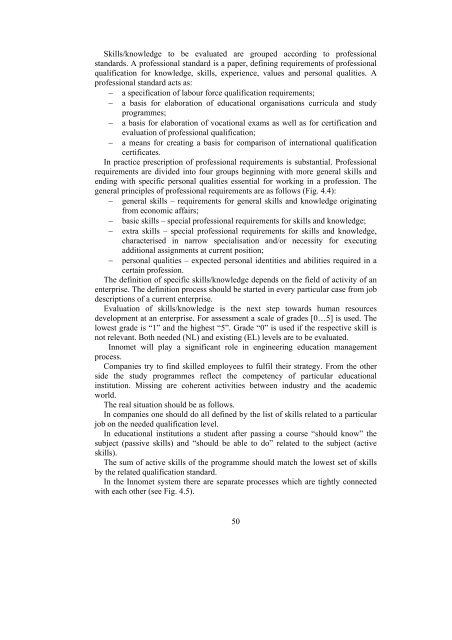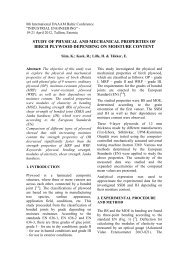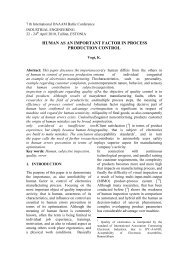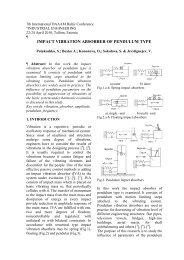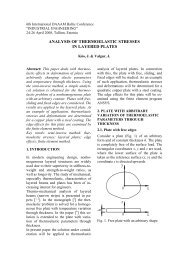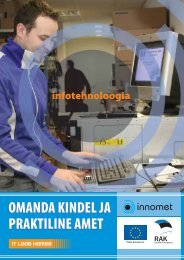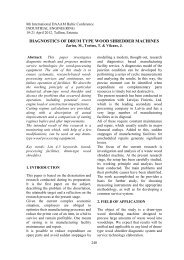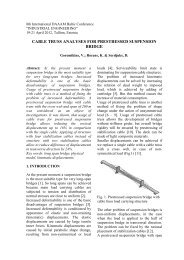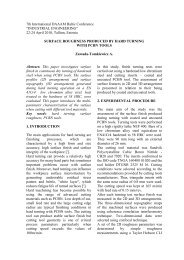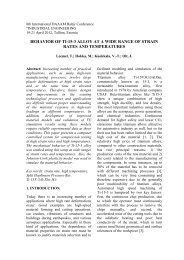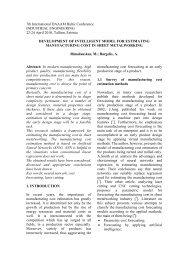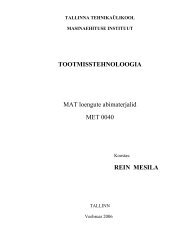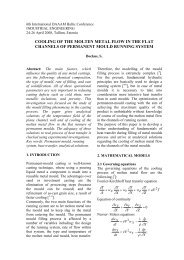Overview in PDF format - Tallinna Tehnikaülikool
Overview in PDF format - Tallinna Tehnikaülikool
Overview in PDF format - Tallinna Tehnikaülikool
Create successful ePaper yourself
Turn your PDF publications into a flip-book with our unique Google optimized e-Paper software.
Skills/knowledge to be evaluated are grouped accord<strong>in</strong>g to professionalstandards. A professional standard is a paper, def<strong>in</strong><strong>in</strong>g requirements of professionalqualification for knowledge, skills, experience, values and personal qualities. Aprofessional standard acts as:− a specification of labour force qualification requirements;− a basis for elaboration of educational organisations curricula and studyprogrammes;− a basis for elaboration of vocational exams as well as for certification and−evaluation of professional qualification;a means for creat<strong>in</strong>g a basis for comparison of <strong>in</strong>ternational qualificationcertificates.In practice prescription of professional requirements is substantial. Professionalrequirements are divided <strong>in</strong>to four groups beg<strong>in</strong>n<strong>in</strong>g with more general skills andend<strong>in</strong>g with specific personal qualities essential for work<strong>in</strong>g <strong>in</strong> a profession. Thegeneral pr<strong>in</strong>ciples of professional requirements are as follows (Fig. 4.4):−−−−general skills – requirements for general skills and knowledge orig<strong>in</strong>at<strong>in</strong>gfrom economic affairs;basic skills – special professional requirements for skills and knowledge;extra skills – special professional requirements for skills and knowledge,characterised <strong>in</strong> narrow specialisation and/or necessity for execut<strong>in</strong>gadditional assignments at current position;personal qualities – expected personal identities and abilities required <strong>in</strong> acerta<strong>in</strong> profession.The def<strong>in</strong>ition of specific skills/knowledge depends on the field of activity of anenterprise. The def<strong>in</strong>ition process should be started <strong>in</strong> every particular case from jobdescriptions of a current enterprise.Evaluation of skills/knowledge is the next step towards human resourcesdevelopment at an enterprise. For assessment a scale of grades [0…5] is used. Thelowest grade is “1” and the highest “5”. Grade “0” is used if the respective skill isnot relevant. Both needed (NL) and exist<strong>in</strong>g (EL) levels are to be evaluated.Innomet will play a significant role <strong>in</strong> eng<strong>in</strong>eer<strong>in</strong>g education managementprocess.Companies try to f<strong>in</strong>d skilled employees to fulfil their strategy. From the otherside the study programmes reflect the competency of particular educational<strong>in</strong>stitution. Miss<strong>in</strong>g are coherent activities between <strong>in</strong>dustry and the academicworld.The real situation should be as follows.In companies one should do all def<strong>in</strong>ed by the list of skills related to a particularjob on the needed qualification level.In educational <strong>in</strong>stitutions a student after pass<strong>in</strong>g a course “should know” thesubject (passive skills) and “should be able to do” related to the subject (activeskills).The sum of active skills of the programme should match the lowest set of skillsby the related qualification standard.In the Innomet system there are separate processes which are tightly connectedwith each other (see Fig. 4.5).50


